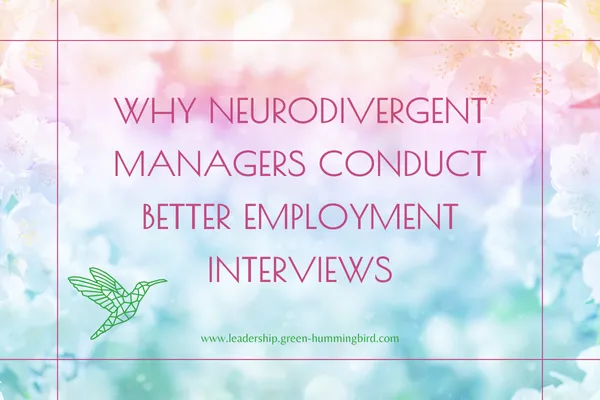
Why Neurodivergent Managers Conduct Better Employment Interviews
This blog post is lightly adapted from a newsletter I sent on June 12, 2024. It also inspired the creation of the product I'm promoting below. You can join my newsletter for more leadership tips developed specifically for neurodivergent individuals (and get a FREE copy of my guide: 15 Minute Employee Check-ins for Neurodivergent Leaders) by signing up here.
Maybe I'm just bad at figuring out the right words to Google (which makes me think that's related to my ND status), but as of the time I wrote this blog post, the only returns I got from my searches about ND Managers conducting interviews were all about how to make the interview more friendly to neurodiverse candidates, the benefits of hiring neurodiverse candidates, and how to go into an interview AS a neurodiverse candidate.
But we already know all that. We're already here. And if you're reading this, you may be in a position to conduct job interviews on behalf of your organization to be sure the people joining your team are a good fit. I happen to believe there are several reasons why we might be better suited to that work than most.
Why ND Managers can be Better Interviewers
I have prided myself for a long time on my ability to choose candidates who would be a good fit and weed out those who would be a bad fit for the position for which I was conducting interviews. In fact, there is only one person I can remember being fully onboard with hiring that I later regretted (they turned out to be an excellent manipulator). And many that I regretted having to work with, who were interviewed when I was unavailable.
The latter is how I know that the skill of interviewing is not widely practiced well. And upon further reflection, I think the way I perceive things (as a neurodivergent leader) differently than neurotypicals has helped me pick up on strengths and weaknesses in the interview that would otherwise be ignored. Perhaps it's my lifetime of masking and close observation to understand how I should be acting in each situation.
Here are my top 4 reasons for why I believe ND individuals are more naturally suited to conducting interviews and choosing the best job candidates:
Observation: Many of us either pay better attention to things than most, or we pay attention to different things than most, or both. While this can be tedious to some, it actually gives us a better insight to much of the world. If we put our minds to figuring out specific people, and observe them, we get pretty good at predicting their potential actions/reactions to specific things. (Not for everyone always, but more than most people even seem to bother.)
Masking: I hate to think of any part of this as a strength, rather than a necessity born out of a culture that does accept us. But while it makes us pretty good at hiding ourselves, it can also make us more thoughtful in our actions than most, and more likely to spot someone's subtle tells when they might be hiding something themselves.
Intuition: The combination of the first two points can give us a pretty decent intuition about people, if we're willing to listen to it. Even if you can't put your hesitancy or excitement about a potential candidate fully into words, it can still be a valuable feeling. Learn to trust it!
Diversity: Our own neurodiversity can make us more open to diversity of all types. We are more likely to identify as LGBTQIA2+. And even if we don't, ND personalities tend to attract other ND personalities, who may identify as queer, so not being accepting tends to leave us rather lonely, on a personal level. We have a tendency to be more concerned with connection on a personality level than most, and since we have difficulty picking up on social cues, we are just as open to observing and respecting other cultures as those we grew up in. This focus on personality can be helpful in identifying candidates who would mesh better with our current teams.
Tips for Conducting Interviews, From One ND Leader to Another
I recently remembered the story I'm telling below, and it reminded me that sometimes leaders are responsible for not only helping to develop the next generation of leaders in their organization, but also to choose who those future leaders might be, and who gets to even try. And if we're not experts in HR, we might not have any training at all as to what to do in an interview. I know at the end of my first time interviewing someone (which I ended up doing alone because everyone else ended up being unavailable), I wanted to end it by asking how it went. (I'm pretty sure I didn't, though.)
With that in mind, here's a few tips I thought of from my years of interviewing (keep in mind that you should still follow all laws that apply to your area and industry while conducting interviews, and behave with integrity throughout the process):
Trust your gut
Have a template or outline for how the interview should progress
Be prepared with questions specific to the applicant and position
Ask questions about vague résumé and cover letter statements
Read the cover letter-- look for signs that they know what your organization does, and possible passion for that work.
Remember that passion, excitement, and teachability go a long way
Don’t count someone out who has no related work experience (some skills, talents, and traits are transferrable no matter the industry)
Check out their extracurriculars, volunteering, and skills/training. They may not even recognize experience they have that applies.
Ask questions that help them better understand the expectations of the position for which they are interviewing
Treat the interview as a chance to get to know the applicant and decide if they would be a good fit for your team, not as a trial for them to overcome.
Remember to assess not only their skills and abilities, but also their personality and how you think they will fit with the rest of the team.
Storytime
While there are many people I can think of that I had a hand in hiring, who I am proud to have worked with, there is also one person I can remember rejecting that I will never regret. On paper, she looked fantastic. She also interviewed extremely well and had a decent background in some of the requirements of the job. She was missing a key preferred skill, but so was I, so I didn’t hold that against her.
There just happened to be a major red flag that I could not get past, which never would have come up until it was too late, if I hadn’t randomly asked about something she listed under trainings she received. It was called something along the lines of “safe space training,” which, at that point in time, I had never heard of. I asked what it was, and it turned out to be training that she was required to receive per her employer on how to become/create a safe space for LGBTQIA2+ individuals they might be serving.
Now, the training sounded really cool to me, but she continued in her explanation to say that while she received the training, she refused to take the certificate, because she didn’t agree with/believe in it.
Hence the red flag.
To be clear, she had been working for a Christian organization on a public, secular college campus when she participated in the training. She was interviewing for another Christian organization when she told me this. So I can see why she thought it would be safe to tell us that she refused to take it… and sadly, why she probably thought that assertion worked in her favor in the interview.
It was absolutely why she was rejected. It wasn’t even something the other interviewer picked up on. But I could not fathom bringing someone who openly admitted to being unsafe for some of our current and future clients to work with into the organization. I knew my boss was desperate to fill that position, but to me, as I focused on the mission of our organization, to serve the most vulnerable in our community, hiring someone who would be a danger to them was not worth it. It would not be kind to the people we served to put them in that position.
Eventually, we hired someone perfect for that position (like, so perfect that I cried when I read her résumé), because she understood what we were doing, because she was a client in the past. We just needed patience and to not let our panic over a possible position being open force us into a bad choice for our organization’s overall mission.
Need Guidance for Conducting Interviews?
When I wrote the email this was based on, it also inspired me to create a guide for fellow Neurodivergent hiring managers to follow, so that you have the steps you need to complete, the understanding of what you should be looking for, and so you can also know when you can and should follow your intuition. Check it out by clicking the picture below!



